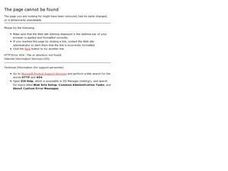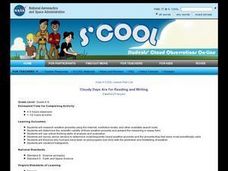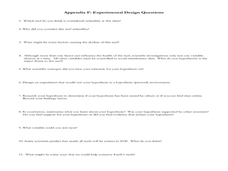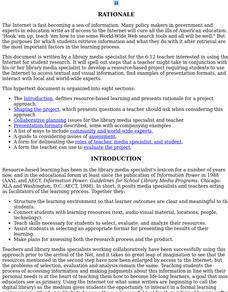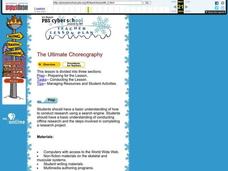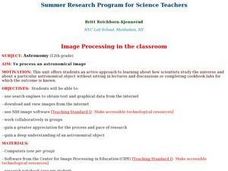Curated OER
The Nesting Habits of Folders
Students create an organized web of nested grade level folers. Within each grade level folder, they create a Language Arts/Social Studies folder and a Math/Science folder. All folders be color coded.
Curated OER
Cloudy Days Are for Reading and Writing
Students consider a variety of well-known proverbs that refer to the weather. They research the scientific validity of these proverbs, conduct interviews about public perception of the proverbs and summarize their findings in writing.
Curated OER
Discovering Dinosaurs
Students research facts about dinosaurs and practice effective speaking strategies by creating a Keynote or PowerPoint presentation in this Science and Language Arts lesson for the upper-elementary classroom. It includes one lesson...
Curated OER
Florida the Best WebQuest
Students create a multimedia presentation demonstrating that Florida is the Best State in this creative project for the early elementary classroom. The lesson can be adapted for any state or country.
Curated OER
German Artists in America
Students use the internet to research selected art vocabulary. They research an assigned German wildlife artist. Using their research, they develop a construct of the artist and his work. Students categorize the artist's work using their...
Curated OER
Thoreau and those he influenced
Eleventh graders work in groups and research assigned person using the internet and use print resources for DHS media center. They create a poster that shows possible connections to H.D. Thoreau's writings and philosophies, a short...
Curated OER
Personalized Masts
Students will use modern International Marine Code Flags to create representations of their names. They will use the inspiration of the sailing vessels to name and create a coat of arms for their ship.
Curated OER
The Amazing Race
Seventh graders engage in a discussion to determine their experience with traveling. Ask them to describe differences in transportation, currency, culture, food, accommodation, etc. Then they discuss the different expenses one has when...
Curated OER
Homework Help In A Hurry
Students discover strategies for getting immediate help with their homework, including online sources in which an adult is available for assistance. They work through a simulated situations in which they visit one of these sites to gain...
Curated OER
Marine Biology Lesson on Understanding the Dynamics of the Reef Ecosystem
Students compare data from a healty and unhealthy reef ecosystem. In this marine biology lesson, students identify which sample is stressed. They formulate a hypothesis on why the reef is stressed and support their hypothesis with proven...
Curated OER
Women's Roles: Then and Now
Fourth graders investigate women's roles during the frontier era in what is today's West Virginia. In this US history activity, 4th graders discuss similarities and differences of women's roles in the past with what women's roles are in...
Curated OER
Rationale
Students consider the rationale behind using the Internet as a research resource tool. They develop a research project, consider how to access and assess new information and format their research for presentation to the class.
Curated OER
The Ultimate Choreography
Eighth graders research the required elements of the short programs in men's and women's figure skating. They analyze the physical requirements of each move and relate the types of muscles, bones, and joints required to perform them.
Curated OER
FACS:Health Careers Planner - Support Services
Learners explore the Support Services Career Pathway using articles in the Health Careers Planner (HCP).
Curated OER
Utah Indian Contributions
Fourth graders study the contributions from the Utah Indian tribes and present their finding either orally or in a PowerPoint.
Curated OER
NC Facts and Symbols
Fourth graders use the internet to research North Carolina facts and symbols.
Curated OER
How Did That Get in My Lunch?
Learners view "The Danger Zone" to learn about food poisoning and the bacterial causes and prevention. Students look at slides, use a worksheet, "Microbial Bugs"and the internet to identify and learn about each bacterium.
Curated OER
Pick Your Favorite Author
Students use the Internet to access information about their favorite author after reading a book by the author. They write a brief summary about the author.
Curated OER
Archeological Pow-Wow
Students, in groups, examine the use of artifacts and fossils to study people, plants and animals from the past.
Curated OER
Effective Lobbying
Students study citizenship issues related to democratic process. They report to the class with posters, graphics and handouts.
Curated OER
Parabolas Exist Where?
Students recognize how parabolas are used in architecture and calculate a constant of variation.
Curated OER
Water Use and Conservation
Young scholars discuss the different types of water found on Earth. They discover why not all water is used for drinking and calculate how much water they use. They create their own water conservation plan.
Curated OER
Image Processing in the Classroom
Twelfth graders determine how scientists study the universe and particular astronomical objects using Internet research, images and NIH software. They work in groups to examine and use imaging software as they study astronomical objects.


